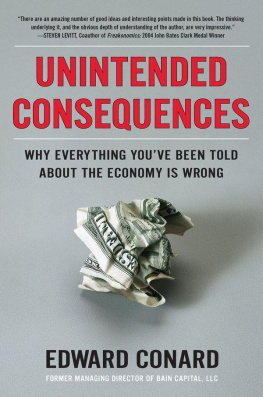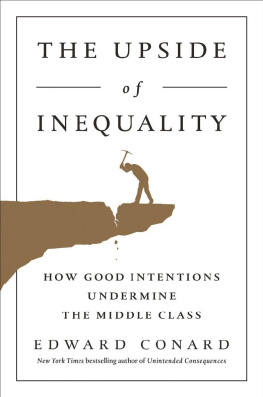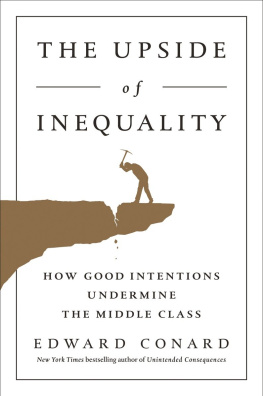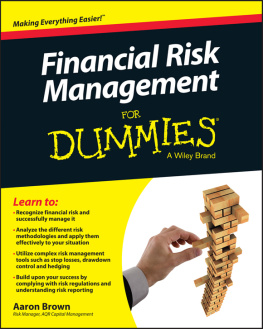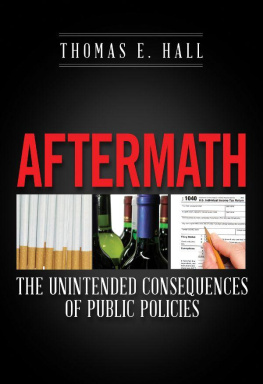Edward Conard has written a provocative and important book about the economy that challenges conventional wisdom about the Financial Crisis, the trade deficit, government policy, and the path to prosperity. His insights into the kind of risk taking we need to spur innovation and job creation are particularly salient, given the inevitable flight from all risk coming out of the crisis. I hope policymakers and business leaders will pay close attention to Conards framework.
William A. Sahlman, Senior Associate Dean, Harvard Business School
Unintended Consequences presents a fascinating and refreshing view of our financial system and how the reactions of Congress and regulators to the near meltdown of 2008 may make our nation less competitive and our banking system less stable. Anyone interested in the future of our financial system needs to read this.
Judd Gregg, Former Chairman of the Senate Budget Committee
Edward Conard identifies the root causes of the Financial Crisis. Washington policymakers will debate Edward Conards analysis for years to come.
Emil W. Henry, Jr., Former Assistant Secretary of the Treasury for Financial Institutions
Finally, common sense! Voters, politicians, and policymakers should take a careful look at this counterintuitive explanation of the contemporary economy and the Financial Crisis. It dispels misconceptions that hamper the recovery and replaces them with insights essential to accelerating it. Even sophisticated economists will find this valuable reading.
Bruce C. Greenwald, Coauthor of Globalization, Professor of Finance, Columbia University, Graduate School of Business
UNINTENDED CONSEQUENCES
WHY EVERYTHING YOUVE BEEN TOLD ABOUT THE ECONOMY IS WRONG
EDWARD CONARD
PORTFOLIO / PENGUIN
PORTFOLIO / PENGUIN
Published by the Penguin Group
Penguin Group (USA) Inc., 375 Hudson Street, New York, New York 10014, U.S.A.
Penguin Group (Canada), 90 Eglinton Avenue East, Suite 700, Toronto, Ontario, Canada M4P 2Y3 (a division of Pearson Penguin Canada Inc.)
Penguin Books Ltd, 80 Strand, London WC2R 0RL, England
Penguin Ireland, 25 St. Stephens Green, Dublin 2, Ireland (a division of Penguin Books Ltd)
Penguin Books Australia Ltd, 250 Camberwell Road, Camberwell, Victoria 3124, Australia (a division of Pearson Australia Group Pty Ltd)
Penguin Books India Pvt Ltd, 11 Community Centre, Panchsheel Park, New Delhi110 017, India
Penguin Group (NZ), 67 Apollo Drive, Rosedale, Auckland 0632, New Zealand (a division of Pearson New Zealand Ltd)
Penguin Books (South Africa) (Pty) Ltd, 24 Sturdee Avenue, Rosebank, Johannesburg 2196, South Africa
Penguin Books Ltd, Registered Offices:
80 Strand, London WC2R 0RL, England
First published in 2012 by Portfolio / Penguin,
a member of Penguin Group (USA) Inc.
Copyright Edward Conard, 2012
All rights reserved
Library of Congress Cataloging-in-Publication Data
Conard, Edward.
Unintended consequences : why everything youve been told about the economy is wrong / Edward Conard.
p. cm.
Includes bibliographical references and index.
ISBN 978-1-101-60258-4
1. United StatesEconomic conditions. 2. United StatesEconomic policy. 3. FinanceUnited States. I. Title.
HC103.C7348 2012
330.973dc23
2012006013
No part of this book may be reproduced, scanned, or distributed in any printed or electronic form without permission. Please do not participate in or encourage piracy of copyrighted materials in violation of the authors rights. Purchase only authorized editions.
For my wife and daughter
CONTENTS
INTRODUCTION
WAS OUR COUNTRYS economic success over the last twenty-five years built on false pretenses? Did we simply borrow and spend too much money? Are we now paying the price for that unsustainable spending spree?
In the aftermath of the Financial Crisis in late 2008 and early 2009, many commonly held beliefs have emerged to explain its causes. Wall Street bankers stand accused of using low down payments, teaser rates, and other predatory tactics to seduce home owners into buying homes they couldnt afford. Critics charge that bankers used fraudulent credit ratings to sell these risky mortgages to unsuspecting investors, bundling pools of risky mortgages into securities in which 80 percent of the cash flows received the lowest-risk, AAA ratingsratings that agencies have long since downgraded. These risky loans and their subsequent defaults, they claim, would have bankrupted our financial infrastructure had it not been for taxpayers bailouts. If taxpayers must provide guarantees to lenders, shouldnt they demand fair compensation for their guarantees?
Many of the same people assert that bankers put our financial infrastructure at risk for their own gain by allegedly funding loans with too much short-term debt and engineering their way around prudent banking regulations while the Bush administration looked the other way. All the while, Wall Street raked in unprecedented pay. Critics blame misaligned incentives and sheer incompetence for this recklessness. Dont we need extensive regulations to protect us from a repeat of this behavior?
Meanwhile, American households stand accused of borrowing recklessly to increase consumption. Over the last twenty years, debt as a percent of gross domestic product (GDP) rose from 250 percent to 350 percent. Personal saving rates declined from a historical average of 10 percent in the 1970s and early 1980s to essentially zero prior to the Crisis. We seem addicted to financing increased consumption, while the trade and fiscal deficits skyrocket. Have we mortgaged our childrens future as a result?
Others believe the Federal Reserve spurred this borrowing by holding interest rates too low after the 2001 recession. They blame cheap credit for artificially driving up real estate prices, which lulled borrowers and lenders into a false sense of confidence and increasingly reckless behavior.
At the same time, the trade deficit exploded as income inequality grew dramatically. Some economists claim that low household saving rates and a corresponding lack of investment eroded U.S. competitiveness. Overheated consumption supposedly tightened our industrial capacity utilization, which drove valuable manufacturing jobs offshore. Critics claim Americans have become a nation of hamburger flippers and that open trade borders and cheap offshore labor have held down the wages of domestic workers. According to the New York Times, 99 percent of the U.S. population went without pay raises for decades as their standards of living declined. Meanwhile, the incomes of the top 1 percent grew 300 percent. Income inequality increased substantially. The evidence seems mighty damning.
To add insult to injury, the tax policies of the Bush administration appear to have allowed reckless risk takers and the beneficiaries of open trade borders to keep an unfair share of these seemingly ill-gotten gains while ordinary citizens suffered. In the end, the prior decade2000 to 2010produced no gains in asset values, employment, or standards of living, the worst decade-wide performance since the Great Depression. Meanwhile, critics claim the government funded tax cuts by scrimping on health care, education, and investments to slow global warming. Fifty million Americans dont have health insurance. Shouldnt politicians raise taxes on the rich to redistribute their ill-gotten gains?
Next page
